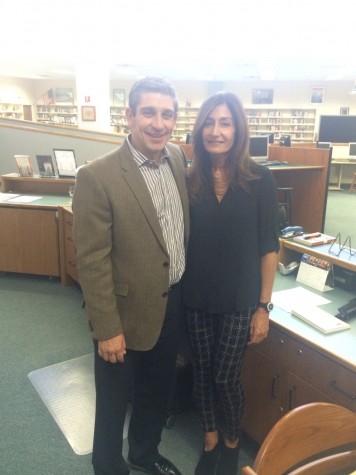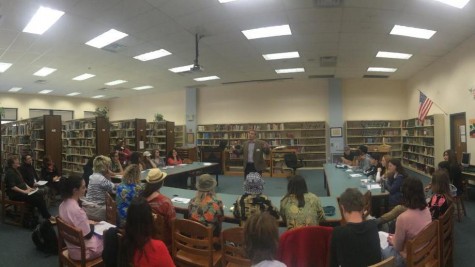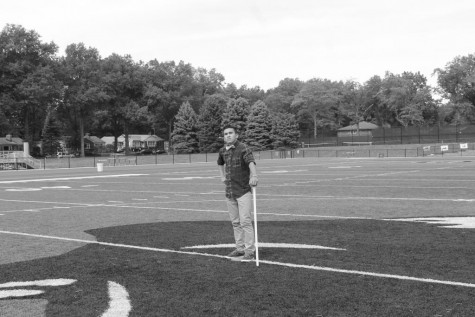President Obama’s Inaugural Poet speaks at Glen Rock High School
Photo Credit: David Martinez
Poet Richard Blanco presents in the Media Center during Period 6 to a group of 30 students and six English teachers.
November 4, 2015
It was like looking in a mirror for one student.
Richard Blanco, author of President Obama’s inaugural poem and other famous writings, spoke at Glen Rock High School on Oct. 30.
Blanco delivered a presentation to juniors and seniors in the morning, attended a luncheon where he conversed with English teachers and students, and, during Period 6, held a workshop with the English department and 30 students in attendance. Students signed up for the specialized workshop through the Mobius literary magazine, The Glen Echo (the school newspaper) and their English classes.
Matt Lacognata, a student at Glen Rock High School, first heard about Blanco at a Mobius meeting, and, once he got to know more about Blanco, Lacognata “was more than excited to learn more about him and his work.”
Blanco was born in Madrid, Spain to a Cuban family. He grew up as a toddler in Florida, then moved up north as an adult. His family was Latin American, and he had come out as being gay in school. He has written that he had been made fun of in his classes.
For Lacognata, who is a junior this year, Blanco’s childhood story resonated.
Growing up, Blanco recalled, he watched the Brady Bunch and wished to be like the children he saw on the screen: he wanted to be Caucasian and “normal,” just like those kids growing up on television. That’s where his obsession with searching for home and identity came from, according to Blanco.

Ms. Linda Hartman and Richard Blanco, President Obama’s inaugural poet, pose for a photograph in the Media Center.
Although he first became an engineer, Blanco was always writing as if it were his job. He realized he wanted to become a writer after writing so much in his free time. He started writing full time after he became the youngest poet to write an inaugural poem. He was commissioned to write a poem about the Boston marathon bombing, which he named Boston Strong. He was recently appointed as education ambassador by the Academy of American Poets.
Ms. Linda Hartman, media specialist at Glen Rock High School’s media center, first heard of Richard Blanco at The Dodge Poetry Festival in 2015. She heard him speak and was impressed with how he engaged the audience.
“The first thing I thought was, ‘Wow, I wonder if he would come to a high school,’” Hartman said.
She called his agent to see if he would be available to come to the school and present some of his poems. Blanco was friendly and engaging on the phone, according to Hartman.
“It felt like I met him before,” she said.
Hartman collaborated with Ms. Patricia Mahoney, the Head of the English Department, to arrange Blanco’s visit to the high school.
The two received the funding for Blanco’s presentation through groups such as the Glen Rock Home-School Association, the Glen Rock Education Foundation, the Boosters Club, and the Board of Education.
In the morning assembly, Blanco presented several poems. He shared one about coming back from Maine to Florida to see if he felt at home, one about wanting to go to a Winn Dixie (a supermarket at the time) where, he felt, only Caucasians shopped, one about his grandma ridiculing his sexuality when he was younger, and his poem for President Barack Obama’s inauguration. All of his poems had one thing in common: the search for home and true identity.
After the assembly, a group of English teachers and students, including Lacognata, went to an art room to have lunch with Blanco. On a long table were sandwiches, wraps, salads, waters, and snacks, but those in attendance focused their attention on Blanco.
“I really liked the lunch,” said Mrs. Diane McNicholas, a teacher in the English department. “It gave everybody a chance to just have an informal conversation with him.”
During the lunch, Blanco talked about how his job as an engineer helped him get started, how he goes about writing and where he derives his inspiration. He also spoke about how to overcome writer’s block.
“You just have to start,” Blanco said. “Sometimes you just have to step away from it, and it just becomes clear.”
From the luncheon, Blanco, the teachers and the students proceeded to the media center, where Blanco led an activity about showing, not telling, in poetry. He revisited a poem that he had read earlier in the day, “Looking for the Gulf Motel,” and had students and teachers alike identify words, phrases, and images that appealed to the five different senses as they appeared in the text.
Lacognata was one of the students who attended the class.
What stood out most to Lacognata about Blanco was “how he presented his work and how he was able to keep attention with his witty dialogue and general unique attitude and mannerisms.”
“All his works and the way he presented them were another standout for me. The presentation itself was engaging, funny and interesting, and he was able to hold my attention for the entirety of It,” Lacognata said.
Prior to the presentation Lacognata had little knowledge of Blanco, other than some poems his teacher had discussed in class.

Speaking to students on Oct. 30, the day before Halloween, Richard Blanco taught about sensory imagery through his poem ‘Looking for the Gulf Motel.” Some students were dressed in costume, and a group of senior girls collectively dressed as tourists.
However, during the presentation, Blanco “presented his entire life, and everything he said applied to me in some way,” according to Lacognata. They both were children of immigrants from Latin American countries and grew up in Latino households. They both expressed their feelings through comparable writing styles and discussed similar emotional issues.
“It’s not everyday that you meet, let alone hear of, someone who has gone through what you have,” Lacognata said. “Especially someone in poetry, which is saturated by people whom I have trouble relating to on a personal level.”
Lacognata said that Blanco impacted him in a lot of ways.
“The most important,” according to Lacognata, “being able to finally relate to someone when previously it was difficult to do so.”
“He kind of just went on stage and started telling me about myself,” Lacognata said. “Well, the first sixteen years of my life. I still have a bit of a ways to go.”
Lacognata said that the advice in poetry shared by Blanco during the lunch and the workshop will improve his writing skills.
“It was finally a relief that someone represented who I am and what I’ve been through,” Lacognata said.
Blanco also had an impact on the teachers in the English department.
“I ordered all of his books, and I had none,” said Ms. Ann Comarato, an English teacher. “I thought about my family and my childhood when he presented the poem about his grandmother.”
Comarato said that the story about his grandmother could be that of anyone’s grandmother with the same idiosyncrasies.
“His vacation place could have been any of our childhoods… We all have something like that,” she said.
For McNicholas, Blanco’s craft and style were some of his most impressive qualities as a writer.
“I really liked how he said that a poem is never finished. You can always change a line and make it better,” she said. “It’s like the poem is alive.”
Another English teacher said, “I really liked how he made himself so vulnerable by just going up there and talking about his life, and how he was so honest.”
Comarato said that she shed a couple of tears while listening to him present. The inner struggles faced by Blanco also affected English teacher Mrs. Jill Astoreca.
“I found myself hanging on every word and just really getting a clear idea of who he was,” Astoreca said. “Not just as a famous author but someone who has had struggles, someone who has experienced writer’s block, and the psychological aspects behind writing.”
Mahoney, who was instrumental in planning the day, said that several students had told her that they have never had a speaker come to the school who meant so much to them.
“That made for a very successful day,” Mahoney said. “It was all just incredibly moving to all of us who participated.”





Katherine Galvagni • Nov 14, 2015 at 2:05 pm
I also enjoyed hearing Richard Blanco’s presentation in the auditorium. Nice article.
MS. LInda Hartman • Nov 13, 2015 at 2:17 pm
David, thank you for a beautiful article on a very special event for GRHS and a very special person, Mr. Blanco. It couldn’t have been a better day!
Ms. Patricia Mahoney • Nov 5, 2015 at 1:18 pm
Thank you for covering this very special day and for capturing it so well! Great job!